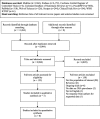The prevalence of obstructive sleep apnea in mild cognitive impairment: a systematic review
- PMID: 31416438
- PMCID: PMC6694482
- DOI: 10.1186/s12883-019-1422-3
The prevalence of obstructive sleep apnea in mild cognitive impairment: a systematic review
Abstract
Background: Previous studies have shown that obstructive sleep apnea (OSA) is associated with a higher risk of cognitive impairment or dementia in the elderly, leading to deleterious health effects and decreasing quality of life. This systematic review aims to determine the prevalence of OSA in patients with mild cognitive impairment (MCI) and examine whether an association between OSA and MCI exists.
Methods: We searched Medline, PubMed, Embase, Cochrane Central, Cochrane Database of Systematic Reviews, PsychINFO, Scopus, the Web of Science, ClinicalTrials.gov and the International Clinical Trials Registry Platform for published and unpublished studies. We included studies in adults with a diagnosis of MCI that reported on the prevalence of OSA. Two independent reviewers performed the abstract and full-text screening, data extraction and the study quality critical appraisal.
Results: Five studies were included in the systematic review. Overall, OSA prevalence rates in patients with MCI varied between 11 and 71% and were influenced by OSA diagnostic methods and patient recruitment locations (community or clinic based). Among studies using the following OSA diagnostic measures- self-report, Home Sleep Apnea Testing, Berlin Questionnaire and polysomnography- the OSA prevalence rates in MCI were 11, 27, 59 and 71%, respectively. In a community-based sample, the prevalence of OSA in patients with and without MCI was 27 and 26%, respectively.
Conclusions: Based on limited evidence, the prevalence of OSA in patients with MCI is 27% and varies based upon OSA diagnostic methods and patient recruitment locations. Our findings provide an important framework for future studies to prospectively investigate the association between OSA and MCI among larger community-based cohorts and implement a standardized approach to diagnose OSA in memory clinics.
Prospero registration: CRD42018096577.
Keywords: Mild cognitive impairment; Obstructive sleep apnea; Prevalence.
Conflict of interest statement
J.W- Reports grants from the Ontario Ministry of Health and Long-Term Care, Anesthesia Patient Safety Foundation and Acacia Pharma outside of the submitted work.
F.C- Reports research support from the Ontario Ministry of Health and Long-Term Care, University Health Network Foundation, Acacia Pharma, Medtronics grants to institution outside of the submitted work, Up-to-date royalties, STOP-Bang proprietary to University Health Network.
All other authors declare that they have no competing interests.
Figures


References
Publication types
MeSH terms
Grants and funding
LinkOut - more resources
Full Text Sources
Medical

